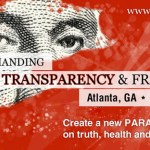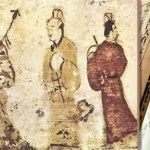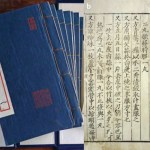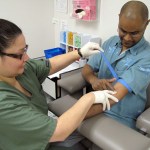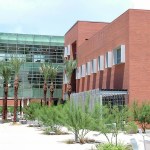
I like to point out from time to time that arguably the most striking difference between science-based medicine (and the evidence-based medicine from which we distinguish it) and alternative medicine, "complementary and alternative medicine" (CAM), or (as it's called now) "integrative medicine" is a concerted effort to change practice for the better based on science and evidence. In other words, in SBM, we are continually doing studies to improve practice. These studies take on two general forms: Comparing new treatments with old to determine if the new treatments work better and, as has…
I consider posts like the one I'm writing now to be public service, an obligation. There are times when I don't want to do them, when they become so sadly, depressingly repetitive in overall outline (and, unfortunately, likely outcome) that it takes an effort to begin. However, given that October is Breast Cancer Awareness Month and as a result these sorts of stories seem to pop out of the woodwork this time of year, I feel I must. It doesn't matter that I just discussed another one of these cases a mere month ago. This time around, the article appears (as is so frequently the case) in The…
I was measured, science-based, and reasonable in yesterday's post about the new American Cancer Society guidelines for screening mammography (which is obviously why that post garnered so few comments, thus teaching me my lesson yet again0, but regular readers know that I can be quite obnoxious and sarcastic and there's a reason why this blog is called Respectful Insolence. It's based on a quote from a character (a computer, actually) in a 35 year old British science fiction series. That character, Orac, is my namesake, and the adopted quote is, "A statement of fact cannot be insolent."
Of…
One of the things that feels the weirdest about having done the same job, having been in the same specialty, for a longer and longer time is that you frequently feel, as the late, great Yogi Berra would have put it, déjà vu all over again. This is particularly true in science and medicine, where the same issues come up again and again and again, often with the same arguments on either side. Sometimes the same players are even involved. So it is with mammography recommendations. Indeed, I'm feeling déjà vu all over again right now, as I read headlines like Women advised to get mammograms later…
If there's one thing that's amusing about the antivaccine movement, it's the disconnect between its members' perception of their own importance and the reality of it, which is that they tend to be a pretty pathetic, risible band. They post their blogs, full of the rage of Dunning-Kruger, thinking that they are putting forth the most sophisticated scientific arguments that real scientists, who have spent their entire professional life studying vaccines and autism, somehow missed and finding evidence of a link that no other scientist can. Of course, pesky things like rigorous study design tend…
Two of the great "icons"—if you can call them "great" given that they're icons but hardly "great"—of the antivaccine movement are Andrew Wakefield and Jenny McCarthy. Over the last decade, they have arguably been the most influential people in the antivaccine movement. The reasons are simple. Let's look at Jenny McCarthy first. In 2007, when her child Evan was diagnosed with autism and she blamed MMR vaccine for it, McCarthy became virtually overnight the single most famous celebrity antivaccine advocate. With her then-boyfriend Jim Carrey, in 2008 she led an antivaccine march on Washington…
If there's one thing I've been consistent about, it's that, however ridiculous all the other woo I routinely discuss here is—homeopathy, reiki, reflexology, I'm talking to you and your friends—herbal medicine and supplements might have value because they might have a physiological effect that is beneficial in treating or preventing disease. Of course, if that's the case, it's because the herb or supplement contains chemicals that act as drugs. They're "dirty" drugs in that they are mixed with all sorts of other substances in the herb or supplement that might or might not have effects, which…
Oh, no, Nature. Not you. Not again.
It wasn't enough that you were busted shilling for traditional Chinese medicine with a big, glossy advertising supplement a few years ago. I thought you had learned your lesson after that, as you didn't do it again. Maybe I was wrong. Granted, your offense this time is not quite as bad as accepting cash from Saishunkan Pharmaceutical Co., ltd. and the Kitasato University Oriental Medicine Research Center to put together what was in essence pure propaganda for quackery, but, on the other hand, I do have to be worried that you might be thinking of backsliding…
One of the more depressing topics that I regularly write about includes of analyses of news stories of children with cancer whose parents decided to stop science-based treatment (usually the chemotherapy) and use quackery instead. There are, of course, variations on this theme, but these stories take form that generally resembles this outline: A child is diagnosed with a highly treatable cancer with an excellent cure rate. Standard science-based treatment is begun, but the child suffers severe side effects from the chemotherapy. After an incomplete course of chemotherapy, the parents, alarmed…
When last I discussed the cruel sham that is the tide of "right-to-try" laws that has been flowing through state legislatures to become law over the last year and a half. "Right-to-try" laws, as I pointed out when I first noted the earliest ones being promoted in Colorado, Louisiana, Arizona, and Missouri, referring to them as Dallas Buyers Club bills based on their seeming inspiration from that movie and pointing out how they are very, very bad policy that, contrary to the claims of its proponents, are far more likely to harm patients than help them. In every state in which such bills have…
Last week, in response to the awarding of the Nobel Prize in Physiology or Medicine to Chinese scientist Youyou Tu, who isolated Artemisinin and validated it as a useful treatment for malaria back in the 1970s, I pointed out that the discovery was a triumph of natural products pharmacology, not of traditional Chinese medicine (TCM). So did Scott Gavura, a pharmacist who blogs at my favorite other blog, Science-Based Medicine, who also emphasized that the path from TCM remedy for fever to pill used to treat malaria was the very model of how pharmacologists isolate medicines from plants.…
Over the years, I've frequently made the points that the vast majority of physicians are not scientists and, in fact, that many of them suffer from a severe case of Dunning-Kruger when it comes to science. Even going back to the very early history of this blog, you can find examples, the most common of which seemed to be physicians denying evolution and embracing creationism. Of these, the doctor I wrote about most frequently back in the day was the creationist neurosurgeon Michael Egnor, but with the onset of the 2016 Presidential race there's been a new creationist neurosurgeon in town with…
Yesterday, I wrote about the winner of the Nobel Prize in Physiology or Medicine, Youyou Tu, who, after screening 2,000 herbal treatments from traditional Chinese medicine (TCM) for anti-malaria activity, finally discovered Artemisinin. She isolated it from the plant in which it is found, using modern chemistry to isolate it, purify it, and later chemically modify it to make it more active against malaria. Tu deserved the Nobel Prize for her years of screening. As I pointed out, contrary to how the awarding of the Nobel Prize to Tu is being spun, it is not a validation of TCM, but rather of…
Earlier this week, the Nobel Prize in Physiology or Medicine was awarded to Youyou Tu for her discovery of the anti-malaria compound Artemisinin, as well as to William C. Campbell and Satoshi Ōmura for their discovery of a novel therapy for roundworm. Artemisinin, as some of you might know, is a compound derived from traditional Chinese medicine, which is why, to my irritation, it didn't take long for headlines like How traditional Chinese medicine finally won its Nobel Prize, What the 2015 Nobel Prizes mean for traditional Chinese medicine, and A Medical Breakthrough Made Possible By Ancient…
Anger is an energy, as a certain old punk sang back in the 1980s. It can even be a great motivator, such as when anger overtakes us for injustice or over crimes. Anger, however, is not a particularly good intellectual tool, nor does it help in analyzing science.
Which reminds me: J.B. Handley is back.
You have to be a bit of a long time reader—OK, a really long time reader—to remember that Mr. Handley's antics used to be a regular topic of this blog. After all, he and his wife were the founders of a long-standing antivaccine group, Generation Rescue. It was an antivaccine group founded on the…
I've written many times about how the relationship between the early detection of cancer and decreased mortality from cancer is not nearly as straightforward as the average person—even the average doctor—thinks, the first time being in the very first year of this blog's existence. Since then, the complexities and overpromising of various screening modalities designed to detect disease at an early, asymptomatic phase have become a relatively frequent topic on this blog. Even more than ten years ago, I noted that screening MRI for breast cancer and whole body CT scans intended to detect other…
Naturopathy is quackery.
I like to start most, if not all, posts about naturopathy with that simple statement. The reasons are simple. First, it's true. Second, most people—including doctors—are unaware of this simple fact. Finally, it irritates naturopaths and their fans. It also has the benefit of setting the tone I want to convey whenever I hear about naturopathy being granted the appearance of academic legitimacy by being embraced by a real academic medical institution. Such were my thoughts when I was made aware of this press release entitled SCNM Offers Dual-Degree Program for Master's…
One of the limitations constraining those of us who do human subjects research is that ethical considerations often prevent us from designing our clinical trials in what would be, from a strictly scientific standpoint, in the most methodologically rigorous way. For example, we can't intentionally infect human beings with known inocula of deadly bacteria in order to cause a reproducible severity of disease to be treated with a new antibiotic.
One thing that antivaccinationists seem unable to understand is this very point with respect to vaccine trials. They will call for a "vaxed versus…
I've spent a lot of time in Cleveland. Indeed, I lived there for eight years in the late 1980s and early 1990s, during which time I completed my surgery residency training, completed my PhD, and, even more importantly, met and married my wife. Even though I haven't lived there for nearly 20 years—I can't believe it's been that long—I still have an affinity for the city, which is perhaps why I've had a tendency to come down hard on venerable Cleveland medical institutions that turn to quackademic medicine, one where I trained (I'm talking to you, University Hospitals of Cleveland) and one…
A week ago, I noted that one of the stranger and less credible conspiracy theories promulgated by quacks and their believers was still going strong nearly three months after the first death that triggered it, the death of autism quack Jeff Bradstreet, apparently by suicide. Basically, three months ago, Dr. Bradstreet, who has long been a fixture in the "autism biomed" movement and a frequent speaker at autism quackfests like Autism One, was found dead in a river from a gunshot wound to the chest, an apparent suicide. A recent story about the investigation into Dr. Bradstreet's death included…




